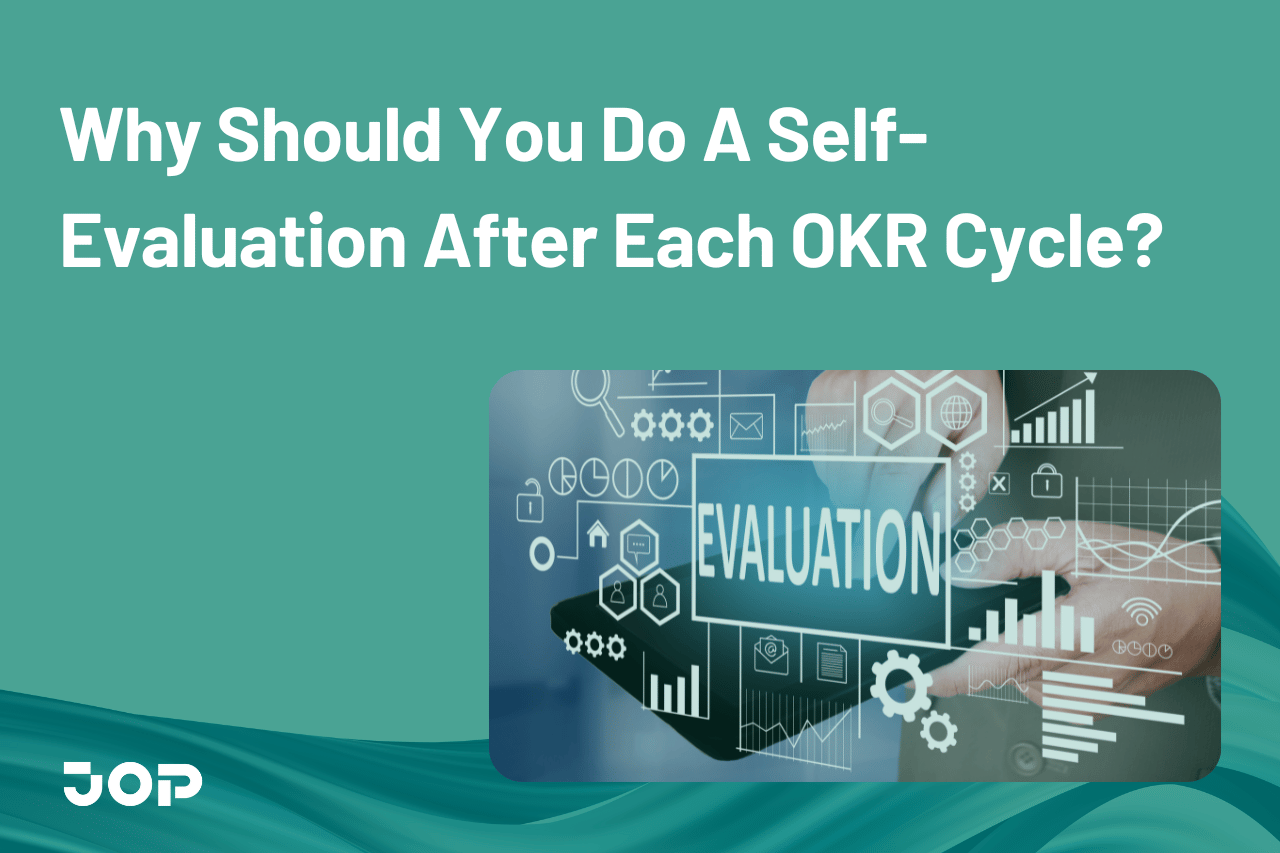Do you engage in monthly or quarterly self-evaluation after each OKR cycle? Employees doing traditional performance reviews dread self-assessment. With the help of OKR software, this process becomes more continuous and less daunting. It’s a yearly thing, and no one can really recall and put their analysis well on paper. Even the managers hate this process.
Employees that get frequent feedback from their managers compared to annual feedback are three times more engaged at work.
Organizations like Adobe scrapped their yearly performance reviews and replaced them with continuous conversations between managers and employees.
Adobe uses the OKR framework to align its teams and continuous performance management to facilitate high productivity. Their people dedicate some time to reflecting on their past performance after each OKR cycle to learn from their mistakes and improve.
Read on to learn how doing self-analysis routinely can enhance people’s performance.

How to self-evaluate your OKRs effectively?
Everyone learns the best lessons from experience. With OKRs, you need to be accurate because the critical business outcomes depend on the chosen objective, and your people seek directions from them.
You can do a self-assessment mid-cycle when you find any OKR invalid and scrap it, or you do it at the end of the OKR cycle when you analyze your past performance.
The primary purpose behind these reflections is to learn from the past. The OKR Software relies on data to measure progress. You can self-evaluate in three main ways.
Objective Rating
Simply look at the percentage of completion of KRs and mark it – as complete, failed, or partially complete. Of course, everyone aims for the successful completion of their KRs.
Subjective self-evaluation
The percentage number does not give an accurate picture of the quality of your work. You must know what you did do well and where did you lack.
Draw a table of your OKRs with their score and subjective evaluation against it.
You must know what you need to prioritize. This is the whole point – to work on what really matters.
Reflecting
It is similar to the subjective evaluation, but it’s more philosophical, and you ask yourself important questions like,
Did I achieve all of my OKRs?
What challenges did I face?
What are my learnings? Etc.
What do you gain from self-evaluating?
John Dewey, American Philosopher – “We do not learn from experience … we learn from reflecting on experience.”
An honest reflection is critical in identifying your shortcomings and improving them in the future. Here are some tangible benefits of self-evaluating in a business using the OKR framework.
Improves OKR setting & implementation
Any new management framework only shows positive results when planned and executed effectively and accurately. The only way to do it is to experiment, learn and improve.
Self-reflections help you identify any errors in the OKRs and give you a clearer context of meaningful objectives. You are also able to make better-informed decisions when you look at your progress data.
Ensure you and your team take a break at each OKR cycle’s end.
Keeps people aligned with business goals
You don’t want a team that just keeps on completing one task after other. Real changes come when you pause and reflect on the objectives that are highly relevant to your business outcomes.
When your team reflects on their last OKR cycle performance, they identify any discrepancies in their execution and the accurate objectives. It’s not always good to focus on the numbers.
For example, when you are cold-calling, the number of calls done does not matter. You have to consider how many prospects you could convert and how long each call went for. This gives them opportunities to improve their execution and prioritize better in the coming OKR cycle.
More accountability
Do your people understand their responsibilities clearly? Take a quick survey and find out how many of them understand how their work impacts the business. You can use the OKR framework to make your people more accountable if they don’t.
KRs direct employees in their daily actions. People can establish direct links to the main business goals through their KRs. Their progress and objectives are completely transparent. By reflecting on their progress each OKR cycle, they become more aware of their responsibilities.
It also helps in more effective collaboration. With each passing OKR cycle, the responsibilities become more transparent, and people take the initiative to approach cross-functional teams.
Supports employee growth
Many organizations still don’t support employee career development. Using the OKR framework is a good way to facilitate employee growth opportunities at work. Focusing on the outcomes rather than completing specific tasks daily gives them a chance to reflect and enhance their performance.
When you stay connected with your people through continuous feedback and conversations, they get a chance to improve. The routine self-evaluation after each OKR cycle adds to the advantages of former organizational practice. People find guidance to work on their weak areas while staying meaningful.
You must train your leaders to implement the best practices for using OKRs. Talk to our OKR experts to learn the best possible ways to achieve this.
FAQs
- What is the purpose of a self-evaluation after an OKR cycle?
A self-evaluation after an OKR cycle allows individuals to reflect on their performance, assess their progress towards their objectives, and identify areas for improvement. This will ensure that you realize what went well and what didn’t, along with the reasons for that.
- How does a self-evaluation help with OKR goal setting?
A self-evaluation can help individuals set more realistic and achievable goals for the next OKR cycle by identifying successes and challenges from the previous cycle.

Gaurav Sabharwal
CEO of JOP
Gaurav is the CEO of JOP (Joy of Performing), an OKR and high-performance enabling platform. With almost two decades of experience in building businesses, he knows what it takes to enable high performance within a team and engage them in the business. He supports organizations globally by becoming their growth partner and helping them build high-performing teams by tackling issues like lack of focus, unclear goals, unaligned teams, lack of funding, no continuous improvement framework, etc. He is a Certified OKR Coach and loves to share helpful resources and address common organizational challenges to help drive team performance. Read More
 Gaurav Sabharwal
Gaurav Sabharwal
